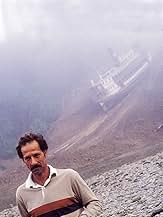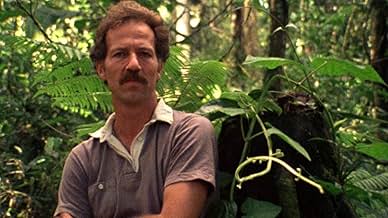A documentary following German auteur Werner Herzog as he deals with difficult actors, bad weather and getting a boat over a mountain, all in an effort to make his film Fitzcarraldo (1982).A documentary following German auteur Werner Herzog as he deals with difficult actors, bad weather and getting a boat over a mountain, all in an effort to make his film Fitzcarraldo (1982).A documentary following German auteur Werner Herzog as he deals with difficult actors, bad weather and getting a boat over a mountain, all in an effort to make his film Fitzcarraldo (1982).
- Won 1 BAFTA Award
- 4 wins & 1 nomination total
- Self
- (as Alfredo de Rio Tambo)
- Self
- (as Angela Reine)
- Self
- (as Elia de Rio Ene)
- Self
- (as David Perez Espinosa)
- Self
- (as Miguel Angel Fuentes)
- Self
- (as Father Mariano Gagnon)
- Self
- (as Huerequeque Bohoroquez)
- Director
- Writer
- All cast & crew
- Production, box office & more at IMDbPro
Featured reviews
Unfortunately, it did not reveal much about Fitzcarraldo. I had read about the problems Herzog had during the filming, and this is basically what Burden's focus is. The documentary does not go deep enough, though. I would say about a quarter of it (its running length is just over 90 minutes) is made up of actual scenes from Fitzcarraldo with maybe a short paragraph to describe the setting and maybe some small bit of behind-the-scene narrative.
Another section of the film is made up of interviews with the cast and crew. This should have been the lifeblood of this documentary, but it was not. Herzog's own interviews were interesting, but it is more or less him complaining because things are not going his way (which he has a right to complain about, but it isn't all that interesting to watch). He has this very silly monologue where he complains about how the jungle symbolizes the death of the world, when really the only thing symbolizing death is his dying film. Very disappointing is the documentarians' inability to get interviews with the cast. I was seriously hoping for some of Klaus Kinski's patented insanity and also at least one interview with the great Claudia Cardinale. There was one tiny interview with Kinski where he complained about having cabin fever for being stuck in the cast camps for weeks at a time, completely justifiable, I would say, and there are no interviews with Cardinale (although she may have been interviewed before I started watching). It made me feel a little disappointed that no documentarians had been there to film Aguirre, the Wrath of God, where Kinski absolutely flipped out!
Never fear, though. There is one very good part of this film: it serves as an ethnographic document for the Indians of South America. Herzog rightly claims that their parts in Fitzcarraldo itself were not sufficiently ethnographic, since they were just doing what he was asking of them. But in the documentary, we see the Indians making masato, an alcoholic drink made of yucca and saliva, we see them playing games such as arrow catching, we even see an attack from a different tribe that believes that the Indians who are working on the film have come to attack them. All of this is extremely interesting. 7/10
In typical Herzog fashion, his movie begins almost to reflect it's very subject, as Herzog finds himself in the Amazon dealing with hundreds of natives, a dangerous political climate, unaccommodating weather, and having to take a three-story thousand ton ship over the same journey Fitzcarraldo would have to (all in the name of realism). In the meantime he discussing the importance of movies, his own fascination/love/hatred of the jungle, and we see a film nearly self-implode many times over.
It's actually pretty grueling work to watch (as is pretty much most of Herzog's films), and Les Blank definitely shows himself to have an intimate understanding of the situation so that he isn't judgmental of Herzog but still able to reveal some of his more, let's say, quirky traits. Some more interesting subject matter is Klaus Kinski, who as you watch you can never tell if he's acting in a scene or just being himself.
--PolarisDiB
Director Les Blank did a reasonably good job at showing the risk in pulling the boat up the muddy hill, but he wasn't effective in asking the harder questions of Herzog. Herzog rationalizes the deaths from plane crashes to the remote location as something that could just as easily have happened to him, and Blank doesn't ask for a full accounting of the people who died in those incidents or others. Herzog rationalizes bringing in prostitutes into the camp as being "expected," rather than ensure his crew wouldn't go into town and not cause trouble with the local women. We only see one woman interviewed who affirms she does it out of necessity, not enjoyment, and no one else commenting about this arrangement. Herzog gives a rather revolting speech about nature being a fornication and an obscenity, a place where harmony doesn't exist, and we see no one else interviewed (like perhaps a native) who may have a differing view. We get a small glimpse about how some of the natives feel about the risk, with one pointing out that Herzog himself should be pushing the boat with them if they all have to, but Blank doesn't relay this to Herzog for his reaction. Heck, we somehow don't even see any of the significant animosity that took place with Klaus Kinski. The documentary is just a little too in love with Herzog to be great, as unique as it is.
I don't say all that to suggest Herzog was evil, it's just that there is so much adulation for how he fulfilled his artistic vision in an uncompromising way that I don't think it's balanced. I am happy that he secured native land rights for the Machiguengas people. I was impressed with his film, and the moments the documentary provided that showed his attention to detail (giving an actor direction) and perfectionism (waiting days to ensure a shot of the natives in their boats would be in the best light, near sunset). There are nuances and complexities here that are fascinating to think through. In the end, I suppose Les Blank was successful, because he made me ponder Herzog's problematic, colonial attitudes and his approach vs. His artistry.
In 1983 I thought it was brilliant and it was immensely valuable to get an insight into the tortured making of the film "Fitzcarraldo". Seeing it again, almost two decades later, I feel the film skims the surface as Les Blank seems to have little interest in drawing out what went on. He just observes and accepts the events at face value. Only Herzog is interviewed at any length and the burden of his dream(s) does become apparent as the film progresses, however there is virtually no comment from Kinski or the other actors. Les Blank might argue that the film is about Herzog's state of mind and his attitude to the production of Fitzcarraldo. In this, I think it is largely a success. To look for more from the film is perhaps to unfairly employ the benefit of hindsight.
I suspect my disappointment (relative) at seeing this again is the release of "My Best Fiend" in the interim. I find my memory conflating the two films, the piece about Kinski's "hate hate" relationship with the jungle (and almost everything else!) would seem more appropriate to "Burdens" but is in "Fiend".
"Burden of Dreams" and "My Best Fiend" would make a good double bill, giving a much more rounded impression of the context of the production of Fitzcarraldo and the relationship between Herzog and Kinski. If you are interested, try to see them both.
Did you know
- TriviaThroughout production, Les Blank and his small crew became exhausted and exasperated from the stress of the work. Blank said that he felt "unconnected" to the people around him. Keeping up with the antics of Werner Herzog and Klaus Kinski proved difficult for the reserved, introverted Blank. By the last week of production, he was so burnt out that he feared coming out of production "like some Viet Nam veterans, horribly calloused". He wrote in his journal, "I'm tired of it all and I couldn't care less if they move the stupid ship - or finish the fucking film".
- Quotes
Werner Herzog: [On the jungle] Kinski always says it's full of erotic elements. I don't see it so much erotic. I see it more full of obscenity. It's just - Nature here is vile and base. I wouldn't see anything erotical here. I would see fornication and asphyxiation and choking and fighting for survival and... growing and... just rotting away. Of course, there's a lot of misery. But it is the same misery that is all around us. The trees here are in misery, and the birds are in misery. I don't think they - they sing. They just screech in pain. It's an unfinished country. It's still prehistorical. The only thing that is lacking is - is the dinosaurs here. It's like a curse weighing on an entire landscape. And whoever... goes too deep into this has his share of this curse. So we are cursed with what we are doing here. It's a land that God, if he exists has - has created in anger. It's the only land where - where creation is unfinished yet. Taking a close look at - at what's around us there - there is some sort of a harmony. It is the harmony of... overwhelming and collective murder. And we in comparison to the articulate vileness and baseness and obscenity of all this jungle - Uh, we in comparison to that enormous articulation - we only sound and look like badly pronounced and half-finished sentences out of a stupid suburban... novel... a cheap novel. We have to become humble in front of this overwhelming misery and overwhelming fornication... overwhelming growth and overwhelming lack of order. Even the - the stars up here in the - in the sky look like a mess. There is no harmony in the universe. We have to get acquainted to this idea that there is no real harmony as we have conceived it. But when I say this, I say this all full of admiration for the jungle. It is not that I hate it, I love it. I love it very much. But I love it against my better judgment.
- How long is Burden of Dreams?Powered by Alexa
Details
- Release date
- Countries of origin
- Languages
- Also known as
- Pelicula o muerte
- Filming locations
- Production companies
- See more company credits at IMDbPro
Box office
- Gross worldwide
- $819





























